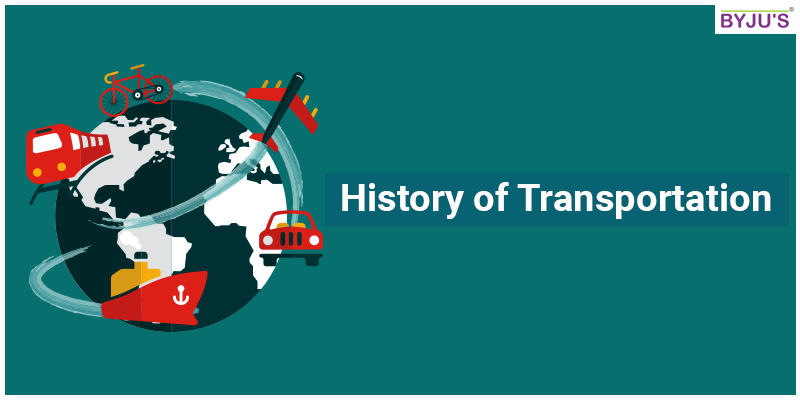Introduction
The history of transportation begins from the human era and continued to change over a period of time. The first means of transportation was the human foot. People used to walk large distances to reach places. The first improvement made to this kind of transportation was adapting to different surfaces. For example, people living in areas with snow and ice wore spike-like attachments so that they didn’t slip on the ground.
People knew that trees and logs float on water and so they dug out the middle portion of logs to form a kind of seating. This helped people use water bodies as a means of transport.
Watch the video and learn about the history of transportation

Around 3500 BC, the first wheeled vehicles were used. As a means of transporting small loads, wheels were attached to carts and chariots. Around the same time constituting to transportation history, people developed simple logs into controllable riverboats with oars to direct the vehicle.
From here people went on to tame animals like horses as a means of transportation. Domesticating animals to use them as a means of transporting people and small goods then started following a trend.

Change in Transportation History with the Discovery of Wheel
Transportation history took a drastic change with the introduction of wheels. Because of the discovery of the wheel and axle other smaller devices like wheelbarrows came into use. Existing means of transportation were continuously improved thereafter. For example, the use of iron horseshoes became a common practice. Clubbing different modes of transportation was then a possibility. For example, horse-drawn vehicles (carts or carriages).
From here, the progress related to transportation started gaining large momentum. Submarines came into existence around 1620 and in the 1660s properly functioning modes of public transportation were available. Carriages, steamboats, cycles and even hot air balloons became functioning vehicles which were used on a large scale.
The first gas engine vehicle was made by Jean Lenoir in the year 1862 and after this, in the year 1867, the first motorcycle was invented. Finally, in the year 1903, the Wright brothers designed the first manned aeroplane with an engine. In the year 1926, the first liquid propelled rocket was launched successfully! Other vehicles like the helicopter, jets and hovercrafts came after this.
Existing means of transport were continuously being improved upon. The steam engines lead to the invention of bullet trains. The manned flight created by the Wright brothers lead to a Jumbo Jet! From travelling on foot we have come a long way and different means of travelling have to lead to a vast network. The types of transportation in existence now are given below.
- Land Transport
- Railways
- Water Transport
- Air Transport or Aviation
- Space Travel
Frequently Asked Questions – FAQs
How many types of transportation exist in today’s world?
- Land Transport
- Railways
- Water Transport
- Air Transport or Aviation
- Space Travel
What is motion?
What is rotary motion?
What are the types of motion?
- Linear Motion
- Rotary Motion
- Oscillatory Motion
What are the types of linear motion?
Rectilinear Motion
Curvilinear Motion

Very good introduction
This was really help full for my project